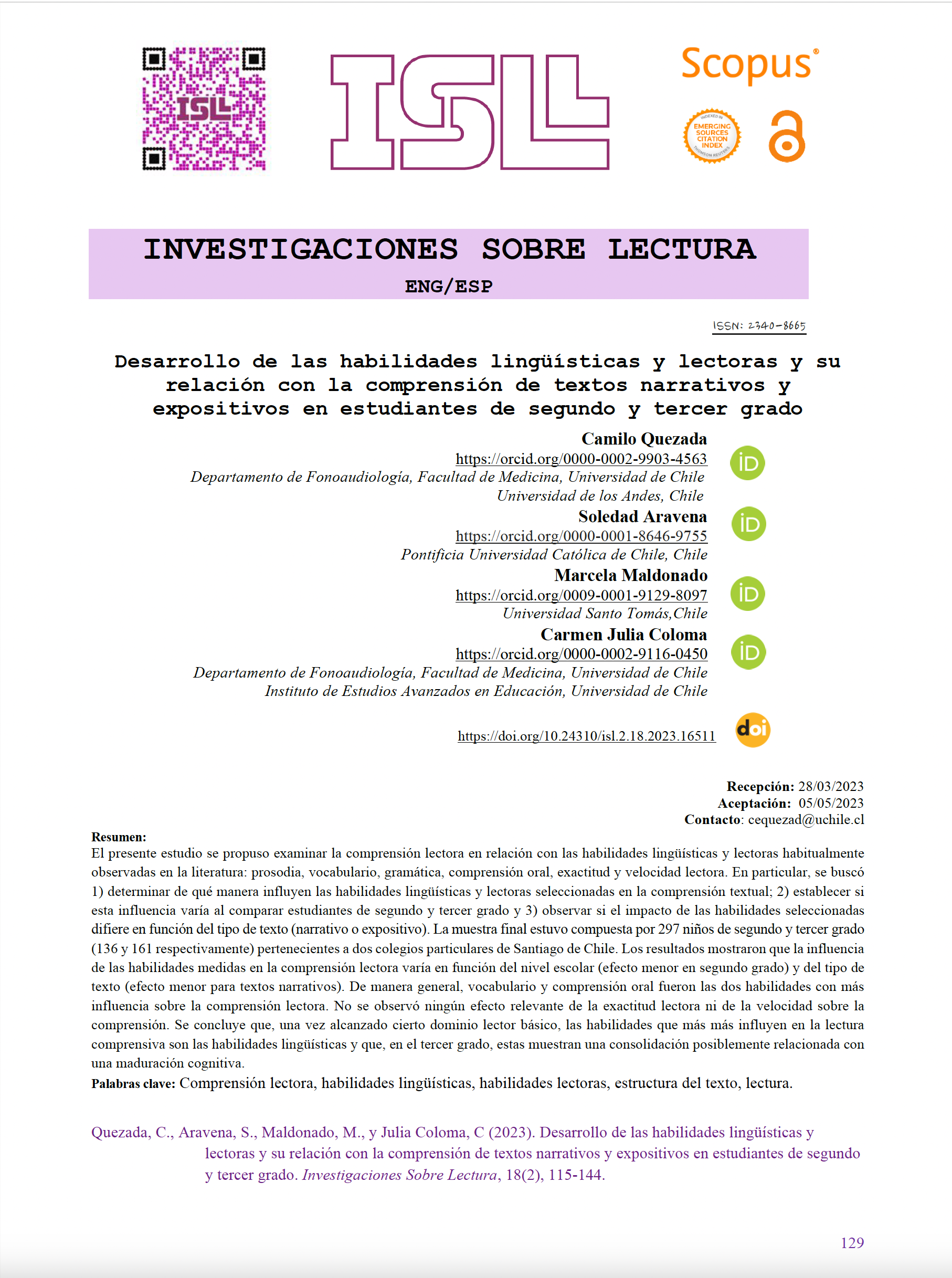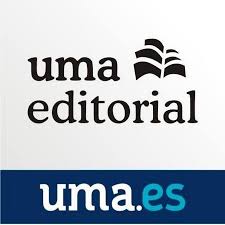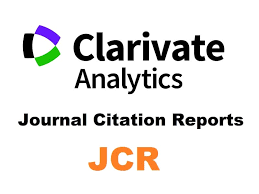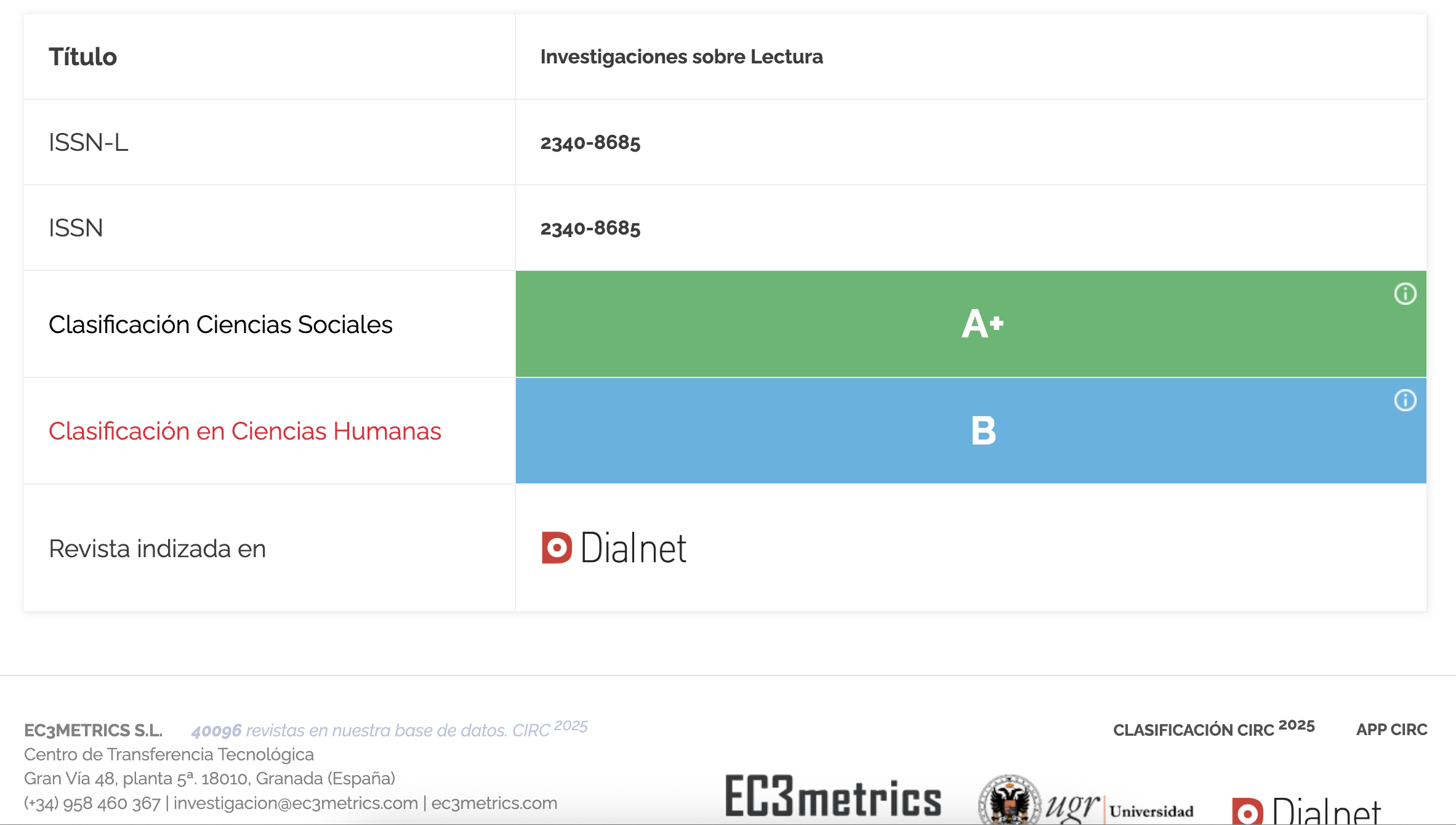Desarrollo de las habilidades lingüísticas y lectoras y su relación con la comprensión de textos narrativos y expositivos en estudiantes de segundo y tercer grado
DOI:
https://doi.org/10.24310/isl.2.18.2023.16511Palabras clave:
comprensión lectora – habilidades lingüísticas – habilidades lectoras – texto narrativo – texto expositivo.Resumen
El presente estudio se propuso examinar la comprensión lectora en relación con las habilidades lingüísticas y lectoras habitualmente observadas en la literatura: prosodia, vocabulario, gramática, comprensión oral, exactitud y velocidad lectora. En particular, se buscó 1) determinar de qué manera influyen las habilidades lingüísticas y lectoras seleccionadas en la comprensión textual; 2) establecer si esta influencia varía al comparar estudiantes de 2º y 3er grado y 3) observar si el impacto de las habilidades seleccionadas difiere en función del tipo de texto (narrativo o expositivo). La muestra final estuvo compuesta por 297 niños de 2o y 3er grado (136 y 161 respectivamente) pertenecientes a dos colegios particulares de Santiago de Chile. Los resultados mostraron que la influencia de las habilidades medidas en la comprensión lectora varía en función del nivel escolar (efecto menor en 2º grado) y del tipo de texto (efecto menor para textos narrativos). De manera general, vocabulario y comprensión oral fueron las dos habilidades con más influencia sobre la comprensión lectora. No se observó ningún efecto relevante de la exactitud lectora ni de la velocidad sobre la comprensión. Se concluye que, una vez alcanzado cierto dominio lector básico, las habilidades que más más influyen en la lectura comprensiva son las habilidades lingüísticas y que, en el tercer grado, estas muestran una consolidación posiblemente relacionada con una maduración cognitiva.
Descargas
Métricas
Citas
Álvarez-Cañizo, M., Cueva, E., Cuetos, F., & Suárez-Coalla, P. (2020). Reading fluency and reading comprehension in Spanish secondary students. Psicothema, 32(1), 75-83.
Aznárez, L., Hossain, I. M., & Cuadro, A. (2021). Desarrollo prosódico en lectura de textos en voz alta de niños uruguayos de 8, 10 y 12 años de edad (Proyecto), FMV_3_2018_1_148928, ANII, Uruguay.
Baker, D. L., Alberto, P. C., Macaya, M. M., García, I., & Gutiérrez-Ortega, M. (2022). Relation Between the Essential Components of Reading and Reading Comprehension in Monolingual Spanish-Speaking Children: a Meta-analysis. Educational Psychology Review, 1-36.
Balbi, A., Cuadro, A., & Trías, D. (2009). Comprensión lectora y reconocimiento de palabras. Ciencias Psicológicas, 3(2), 153-160.
Bizama, M., Arancibia, B., Sáez, K., y Loubiès, L. (2017). Conciencia sintáctica y comprensión de lectura en niñez vulnerable. Revista Latinoamericana de Ciencias Sociales, Niñez y Juventud, 15(1), 219-232.
Cain, K. (1996). Story knowledge and comprehension skill. In C. Cornoldi & J. Oakhill (Eds.), Reading comprehension difficulties: Processes and intervention (pp. 176–192). Lawrence Erlbaum Associates.
Cadime, I., Rodrigues, B., Santos, S., Viana, F.L., Chaves-Sousa, S., Céu Cosme, M., & Ribeiro, I. (2017). The role of word recognition, oral reading fluency and listening comprehension in the simple view of reading: a study in an intermediate depth orthography. Reading and Writing, 30, 591-611. DOI 10.1007/s11145-016-9691-3
Calet, N., Gutiérrez-Palma, N., Simpson, I., González-Trujillo, M.C., & Defior, S. (2015). Suprasegmental Phonology Development and Reading Acquisition: A Longitudinal Study. Scientific Studies of Reading, 19, 51-71.
Clinton, V., Taylor, T., Bajpayee, S., Davison, M. L., Carlson, S. E., & Seipel, B. (2020). Inferential comprehension differences between narrative and expository texts: a systematic review and meta-analysis. Reading and Writing, 33(9), 2223-2248.
Cohen J. (1992). A power primer. Psychological bulletin, 112(1), 155–159. https://doi.org/10.1037//0033-2909.112.1.155
Cromley, J. G., & Azevedo, R. (2007). Testing and refining the direct and inferential mediation model of reading comprehension. Journal of Educational Psychology, 99(2), 311-325. https://doi.org/10.1037/0022-0663.99.2.311
Cuetos, F., Rodríguez, B., Ruano, E. & Arribas, D. (2014). PROLEC-R. Batería de Evaluación de los Procesos Lectores, revisada (5ª ed.). TEA Ediciones.
De Mier, M.V., Borzone, A.M., y Cupani, M. (2012). La fluidez lectora en los primeros grados: relación entre habilidades de decodificación, características textuales y comprensión. Un estudio piloto con niños hablantes de español. Revista Neuropsicología Latinoamericana, 4(1), 18-33.
De Mier, V., Borzone, A. M., Sánchez Abchi, V. y Benítez, M. E. (2013). Habilidades de comprensión y factores textuales en los primeros grados. Revista Peruana de Psicología y Trabajo Social, 2(1), 89-106.
Diakidoy, I.N. (2014). The effects of familiarization with oral expository text on listening and reading comprehensionlevels. Reading Psychology, 35(7), 622-643. https://doi.org/10.1080/02702711.2013.790327
Diakidoy, I. N., Stylianou, P., Karefillidou, C., & Papageorgiou, P. (2005). The relationship between listening and reading comprehension of different types of text at increasing grade levels. Reading Psychology, 26, 55-80.
Duke, N. K. (2000). 3.6 minutes per day: The scarcity of informational texts in first grade. Reading Research Quarterly, 35, 202-224.
Echeverría, M., Herrera, M. A., y Segure, J.T. (2009). TEVI-R. Test de Vocabulario en Imágenes. Universidad de Concepción.
Ehren, B. J., Murza, K. A., & Malani, M. D. (2012). Disciplinary literacy from a speech–language pathologist’s perspective. Topics in Language Disorders, 32(1), 85-98. https://doi.org/10.1097/ TLD.0b013e318244e8d4
Ferroni, M., y Jaichenco, V. (2022). Comprensión oral y escrita: efectos de la estructura textual. Interdisciplinaria, 39(3), 139-150. https://doi.org/10.16888/interd.2022.39.3.8
Figueroa, S. & Gallego, J. (2021). Relación entre vocabulario y comprensión lectora: Un estudio transversal en educación básica. Revista signos. estudios de lingüística, 54(106) 354-375.
Florit, E., Roch, M., Dicataldo, R., & Levorato, M. C. (2022). The Simple View of Reading in Italian beginner readers: Converging evidence and open debates on the role of the main components. Learning and Individual Differences, 93, 101961.
Friedman, N. P., & Miyake, A. (2017). Unity and diversity of executive functions: Individual differences as a window on cognitive structure. Cortex; a journal devoted to the study of the nervous system and behavior, 86, 186–204. https://doi.org/10.1016/j.cortex.2016.04.023
Graesser, A. C., McNamara, D. S., & Louwerse, M. M. (2003). What do readers need to learn in order to process coherence relations in narrative and expository text? In A. P. Sweet & C. E. Snow (Eds.), Rethinking reading comprehension (pp. 82-98). Guilford.
Jiménez, J., García, E., Estévez, A., Díaz, A., Guzmán, R., Hernández-Valle, I., Ortiz, M.R., Rodrigo, M., y Hernández, S. (2004). Evaluación del procesamiento sintáctico- semántico en la dislexia evolutiva. Revista Electrónica de Investigación Psicoeducativa y Psicopedagógica, 2(2), 127-142.
Kim, Y., & Pallante, D. (2012). Predictors of reading skills for kindergartners and first grade students in Spanish: A longitudinal study. Read Write, 25(1), 2-22.
Kim, Y. S., & Wagner, R. K. (2015). Text (Oral) Reading Fluency as a Construct in Reading Development: An Investigation of its Mediating Role for Children from Grades 1 to 4. Scientific studies of reading : the official journal of the Society for the Scientific Study of Reading, 19(3), 224–242. https://doi.org/10.1080/10888438.2015.1007375
Kuhn, M., Jackson, S., & Cimentada, J. (2020). Correlations in R. R Package Version 0.4, 3, https://CRAN.R-project.org/package=corrr
Leslie, L., & Caldwell, J. S. (2017). Assessments of reading comprehension: Challenges and directions. In S. Israel (Ed.), Handbook of research on reading comprehension (pp. 219-271). Guilford.
López-Escribano, C., Elosúa de Juan, M. R., Gómez-Veiga, I., & García-Madruga, J. A. (2013). A predictive study of reading comprehension in third-grade Spanish student. Psicothema, 25(2), 199-20.
Lundine, J.P., Harnish, S.M., McCauley, R.J., Blackett, D.S., Zezinka, A., Chen, W., & Fox, R.A. (2018). Adolescent Summaries of Narrative and Expository Discourse: Differences and Predictors. Language, Speech, and Hearing Services in Schools, 49, 551-568.
Lynch, J., van den Broek, P., Kremer, K, Kendeou, P., White, M. J. & Lorch, E. (2008). The development of narrative comprehension and its relation to other early reading skills. Reading Psychology, 29, 327-365.
Mar, R. A., Li, J., Nguyen, A.T. & Ta, C.P. (2021). Memory and comprehension of narrative versus expository texts: A meta-analysis. Psychonomic Bulletin & Review, 28(3), 732-749.
McNamara, D. S., Floyd, R. G., Best, R., & Louwerse, M. (2004). World knowledge driving comprehension difficulties. In Y. B. Kafai, W. A. Sandoval, N. Enyedy, & A. S. Nixon (Eds.), Proceedings of the 6th International Conference of the Learning Sciences (pp. 326–333). Lawrence Erlbaum Associates.
Montesinos, M. M. T., Salceda, J. C. R., Alonso, G. A., & Joshi, R. M. (2022). Simple view of reading in Spanish: A longitudinal study. Revista de Logopedia, Foniatría y Audiología.
Nippold, M. A. (2014). Language intervention at the middle school: Complex talk reflects complex thought. Language, Speech, and Hearing Services in Schools, 45(2), 153-156. https://doi.org/ 10.1044/2014_LSHSS-14-0027.
Perfetti, C. A. (1985). Reading ability. Oxford University Press.
R Core Team (2022). R: A language and environment for statistical computing. R Foundation for Statistical Computing, Vienna, Austria. URL https://www.R-project.org/
Recio-Pineda, S. (2017). Prosodia y comprensión lectora en Educación Primaria [Tesis Doctoral, Universidad de Barcelona]. https://www.tdx.cat/handle/10803/454820?locale-attribute=en#page=1
Riffo, B., Caro, N., y Sáez, K. (2018). Conciencia lingüística, lectura en voz alta y comprensión lectora. Revista de Lingüística Teórica y Aplicada, 56(2), 175-198.
Ripoll-Salceda, J. C., Tapia Montesinos, M., & Aguado-Alonso, G. (2020). Reading rate in Spanish- speaking students: A meta-analysis. Revista de Psicodida?ctica, 25(2), 158–165.
Rosas, R., Espinoza, V., Martínez, C., & Santa-Cruz, C. (2022). Playful Testing of Executive Functions with Yellow-Red: Tablet-Based Battery for Children between 6 and 11. Journal of Intelligence, 10(4), 125. https://doi.org/10.3390/jintelligence10040125
Schwanenflugel, P.J., & Benjamin, R.G. (2017). Lexical prosody as an aspect of oral reading fluency. Reading and Writing, 30, 143–162. https://doi.org/10.1007/s11145-016-9667-3
Shah, A. D., Bartlett, J. W., Carpenter, J., Nicholas, O., & Hemingway, H. (2014). Comparison of random forest and parametric imputation models for imputing missing data using MICE: a CALIBER study. American journal of epidemiology, 179(6), 764–774. https://doi.org/10.1093/aje/kwt312
Snyder, L. & Caccamise (2010). Comprehension Processes for Expository Text: Building. In M.A. Nippol & C.M. Scott (Eds.), Expository Discourse in Children, Adolescents, and Adults. Development and Disorders (pp. 32-68). Psychology Press.
Tabullo, A.J., Wainselboim, A.J. & París, L.A. (2022). La comprensión de textos expositivos y narrativos y su relación con el vocabulario. la eficacia lectora y el control inhibitorio en niños de cuarto grado. Traslaciones. Revista Latinoamericana de Lectura y Escritura, 9(17), 39-59.
Tighe, E. L., Spencer, M., & Schatschneider, C. (2015). Investigating Predictors of Listening Comprehension in Third-, Seventh-, and Tenth-Grade Students: A Dominance Analysis Approach. Reading psychology, 36(8), 700–740. https://doi.org/10.1080/02702711.2014.963270
Vergara, D., Strasser, K. & Del Río, M. (2016). Más que palabras por minuto: Las otras habilidades que afectan la comprensión en primero básico. Calidad en la Educación, 4, 46-67.
Zevallos, D., Arcos, N., & Ripoll, J. C. (2017). La concepción simple de la lectura en alumnos de cuarto de primaria de una escuela fiscal de Quito. Alteridad, 12(1), 115-122.

Publicado
Versiones
- 02-01-2024 (3)
- 22-12-2023 (2)
- 22-12-2023 (1)
Cómo citar
Número
Sección
Licencia
Derechos de autor 2023 Camilo Quezada Gaponov, Soledad Aravena, Marcela Maldonado, Carmen Julia Coloma

Esta obra está bajo una licencia internacional Creative Commons Atribución-NoComercial-CompartirIgual 4.0.
Todos los contenidos publicados en Investigaciones sobre Lectura están sujetos a la licencia Creative Commons Reconocimento-NoComercia-Compartirigual 4.0 cuyo texto completo puede consultar en <http://creativecommons.org/licenses/by-nc-sa/4.0>
Se pueden copiar, usar, difundir, transmitir y exponer públicamente, siempre que:
- Se cite la autoría y la fuente original de su publicación (revista, editorial y URL de la obra).
- No se usen para fines comerciales.
- Se mencione la existencia y especificaciones de esta licencia de uso.
Los derechos de autor son de dos clases: morales y patrimoniales. Los derechos morales son prerrogativas perpetuas, irrenunciables, intransferibles, inalienables, inembargables e imprescriptibles. De acuerdo con la legislación de derechos de autor, Investigaciones sobre Lectura reconoce y respeta el derecho moral de los/las autores/as, así como la titularidad del derecho patrimonial, el cual será cedido a la Universidad de Málaga para su difusión en acceso abierto. Los derechos patrimoniales, se refieren a los beneficios que se obtienen por el uso o divulgación de las obras. Investigaciones sobre la Lectura se publica en open access y queda autorizada en exclusiva para realizar u autorizar por cualquier medio el uso, distribución, divulgación, reproducción, adaptación, traducción o transformación de la obra.
Es responsabilidad de los/las autores/as obtener los permisos necesarios de las imágenes que están sujetas a derechos de autor.




















30.png)




